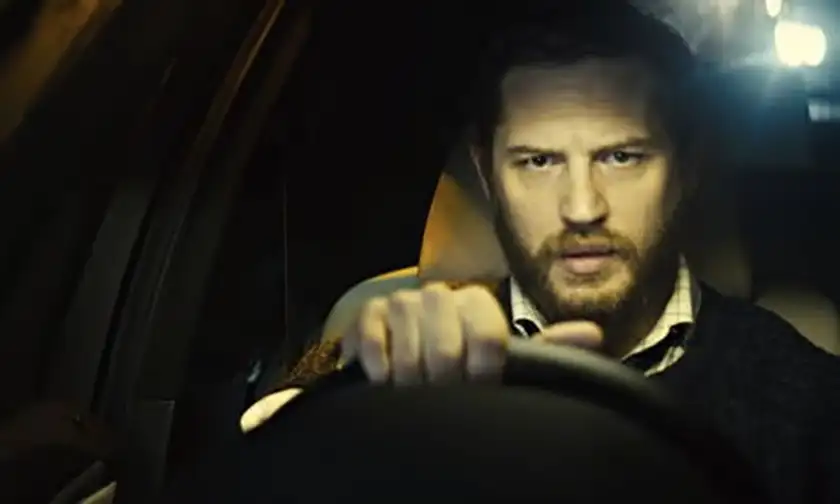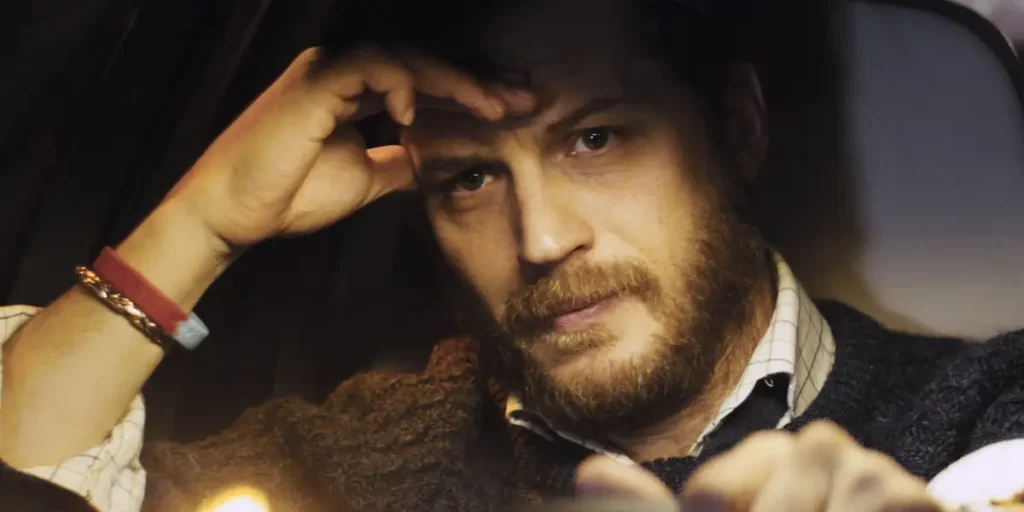Locke explores the complex morality of the ordinary man, blurring the line between responsibility and self-righteousness.
Author: Nikos Branikas
Director: Steven Knight
Genre: Psychological Drama
Run Time: 85′
Rated: R
US Release: April 25, 2014
UK Release: April 18, 2014
Where to watch: on digital and on demand
Most people view ethics and morality as academic subjects that belong to the realm of abstract ideas, separated from our mundane daily lives. This, however, couldn’t be further from the truth, as ethics are meant to inform us of how we should act, what the right thing to do is, and hence, how we should live. Steven Knight brings this point home with his 2013 drama, Locke, featuring Tom Hardy as Ivan Locke, a construction manager whose life unravels over the course of a single car journey.
And yes, that means that the film takes place entirely within the confines of a car. Locke is a simple yet masterful case study of the complex morality that drives (pun intended) the actions of the ordinary man, doing so in a much subtler way than most other films exploring similar themes.
The story follows Ivan Locke leaving a construction site after receiving a phone call that would change his entire life. Bethan (Olivia Colman, of Joyride), a woman he had a one-night stand with, is about to give birth to his child, and he decides to go on a solo drive to London to witness their birth, instead of heading home to his family after work. As he drives to the hospital, we learn about his job, his family, and the consequences of his decisions through phone calls with all the different characters, and with monologues addressed to his dead father. We are thrust into Ivan’s world at the beginning of that fateful night, right after he receives the call from Bethan informing him that her waters broke two months prematurely. This means that his situation and the events that unfold throughout the film are as sudden to us as they are to him.
Ivan’s decisions ultimately end up costing him his job and his family – a price he is willing to pay if it means doing the right thing. He endures the pain that he inadvertently causes to others, as well as the consequences to his own life, seemingly out of a sense of accountability and honor. But while his actions might appear duty-bound and valiant at first, as the film progresses, we are led to believe that his motives are highly vindictive and selfish, which makes us uncover an entirely different person. This shines a new light on Locke’s character and raises broader ethical considerations about the nature of moral responsibility.
Can actions driven by self-serving motives be considered good? Does it ultimately matter why Ivan acts the way he does, or is the significance of his actions determined solely by their consequences? This question is part of an age-old debate between deontological ethics, which emphasizes the importance of moral principles and duties, and consequentialist ethics, which evaluates the morality of actions based on their outcomes. Depending on which ideology one subscribes to, the integrity of Ivan Locke’s character may come under scrutiny.

On the surface, Locke appears to be a story about a good man trying to rectify a single mistake. Ivan Locke is portrayed as a responsible and righteous man who values honesty and duty above all. We see that by his decision to leave his job site the day before one of the largest concrete pours in all of Europe, leading to him getting fired, as he expected. And despite not having a job anymore, he still makes sure that the work will go as planned, giving instructions to his trainee on the phone and solving problems as they arrive. So we see a strong sense of duty and responsibility in him, both for his job, and for the child he fathered during an affair. He even says during a monologue that he slept with Bethan out of drunken pity, something that’s probably true, or at least very believable.
Our confidence in Locke’s character is reinforced by the way he handles what seems to be a nearly universal lack of compassion towards him. This can be seen by how his boss berates him and is unbothered by Ivan getting fired, following his decision to not attend work the next day. We also see a lack of compassion from his wife, when, after learning that he is about to father another child, she ultimately decides to leave him, refusing to discuss the issue further. Even his work trainee snaps at him at a certain point when Ivan tries to give him instructions. But during all of this, Ivan maintains a Stoic demeanor, focusing on what has to be done and not reciprocating any ill will.
However, as the film progresses, it becomes evident that Ivan’s motivations are more complex than they would initially appear to be. We can easily see that one of the main driving forces behind his actions is his deep-seated resentment and desire for revenge against his father, whose abandonment scarred him deeply. We learn of these feelings through monologues directed at his dead father, consisting of mockery, curses, and rage-filled outbursts. This reveals a very troubled individual who has huge unresolved issues of neglect and betrayal.
This undermines Locke’s “goodness,” as this darker side of him juxtaposes the archetype of the knight in shining armor that he may have previously inhibited. By questioning the purity of his motives, by doing away with honor and bravery, we can no longer consider Locke “good” under deontological ethics. We see him as someone who acts out of self-interest and impure motivations rather than from a sense of duty.
Which brings us to another underlying motivation for Ivan’s actions: his pride. Throughout the film, he is determined to maintain his composure, keep his life from falling apart, and solve any problem that arises, no matter the cost. That goes for his job and his family, as in both cases he has decided what needs to be done, and when someone disagrees with him, he either dismisses them, or he tries to persuade them. And we can see that this approach has worked so far, as he is revered and respected in his job, and his family adores him.
When his trainee found Stefan, a Polish concrete farmer, Stefan told him that Ivan is “the best man in England.” Before that, while talking to his father, Ivan declares that his child will be okay because their name will be “Locke,” and then proceeds to claim that the Lockes were “a long line of sh*t,” but that he “straightened the name out.” Here, we see Ivan taking pride in his actions while showing a severe disdain not just for his father but for his entire lineage. By seeing himself as the redeemer of his ancestors’ sins, his actions and choices carry more weight and are all the more grandiose, at least in his eyes. So in that moment, it is evident that both Ivan’s pride and his animosity against his father are guiding his decisions.
Ivan also displays a potent sense of ownership over his actions. He refers to the site that will be raised as “his building,” even though he was fired and won’t be there for the concrete pour. He also refers to the newborn child as “his mistake,” leaving Megan out of the equation, and he takes full credit for the perceived redemption of his surname. However, this extreme ownership of his actions leaves him indifferent to how they emotionally affect other people. His boss, his wife, his kids, and Megan are all victims of Ivan’s absolute moral code that bears no bending. Even when exposed to anger, distress, or intense sadness, Ivan never considered doing anything other than what his morality dictated. Apart from being driven by pride and revenge, this morality leaves no room for empathy, which is an integral part of “goodness.”
As children, we thought of good and bad in simple, dualistic terms, like black and white. However, as the film shows us, things in the real world are rarely that simple, and the same can be said of Locke himself. He cannot simply be dismissed as a good man caught up in an unfortunate – or even unjust – conundrum of his own doing, nor can he be viewed as an inherently bad person, a typical villain.
If the road to hell is paved with good intentions, Locke tries to take the opposite path and lead us to heaven through arrogant and spiteful motives. But that, I’m afraid, is not possible.
Locke is now available to watch on digital and on demand.
Loud and Clear Reviews has an affiliate partnership with Apple, so we receive a share of the revenue from your purchase or streaming of the films when you click on the button on this page. This won’t affect how much you pay for them and helps us keep the site free for everyone.

